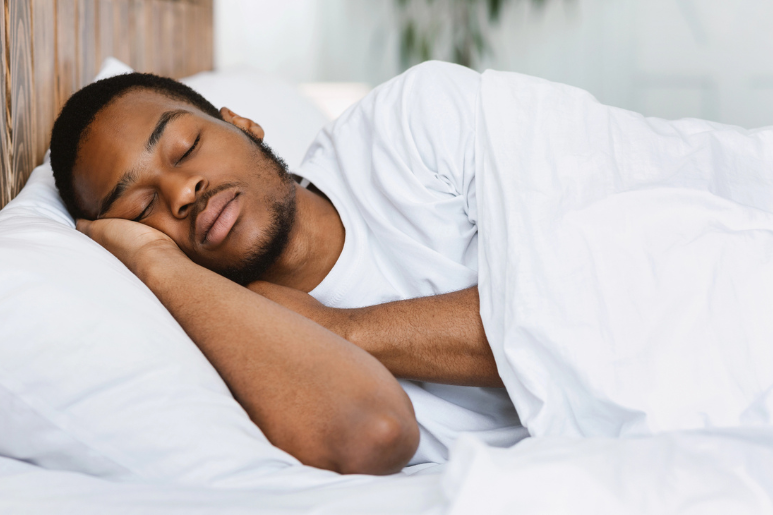July 28, 2025
Sleeping After Your Hair Restoration – Top Tips and Recommendations for Better Healing

You've taken a major step toward restoring your confidence with a hair restoration procedure at Hair Restoration Institute. Congratulations! Now that the hard part is behind you, it's time to focus on recovery—and one of the most important (and often overlooked) parts of that process is how you sleep.
Yes, your sleep habits can significantly impact your results in those first few days and weeks after surgery. Proper post-op care while sleeping helps minimize swelling, protect newly transplanted grafts, and encourage optimal healing.
Here’s what you should know to sleep smart and support your best possible outcome.
Why Sleep Matters After Hair Restoration
Your body does most of its healing while you sleep, so getting proper rest is critical. But beyond just “getting enough sleep,” how you sleep directly affects your recovery:
Prevents dislodging grafts
Reduces swelling and inflammation
Minimizes the risk of infection or irritation
Supports better circulation and cell regeneration
The first few nights are key. After that, things get easier—but following the right sleep practices early on can make a noticeable difference in your results.
Tip #1: Sleep With Your Head Elevated
For the first 3 to 7 nights, sleep with your head propped up at a 30–45-degree angle using two or three pillows, a wedge pillow, or by sleeping in a recliner.
Why it helps:
This elevation reduces blood flow to the scalp, which helps minimize swelling and fluid buildup around the forehead and eyes. It also helps keep pressure off the surgical site.
Tip #2: Avoid Sleeping on Your Stomach or Side
We recommend sleeping on your back to prevent friction, pressure, or unintentional graft damage.
Why it helps:
Side or stomach sleeping can cause your scalp to rub against the pillow, which could dislodge grafts or irritate incisions. Back sleeping protects the treated areas and keeps things stable during those delicate early days.
Tip #3: Use a Neck Pillow for Extra Support
A U-shaped neck pillow (like those used for travel) can help prevent you from rolling over in your sleep and provide gentle support to keep your head in place.
Why it helps:
It creates a cushion around your head without putting pressure on the scalp, and it keeps you from inadvertently turning during the night.
Tip #4: Use a Clean, Soft Pillowcase
Opt for clean, breathable pillowcases—preferably cotton—and change them nightly during the first week of recovery.
Why it helps:
This minimizes bacteria, sweat, or oil buildup that could cause infection. A clean sleep environment promotes healthy healing and protects the sensitive areas from irritation.
Tip #5: Don’t Be Alarmed by Some Shedding
In the weeks following surgery, it’s completely normal to see some of the transplanted hairs shed—this is called “shock loss” and is part of the natural hair growth cycle. Sleep habits won’t prevent this, but being gentle and careful during sleep can help avoid unnecessary trauma that could affect long-term growth.
Bonus Tips for Better Sleep & Healing
Stay hydrated – Proper hydration supports healing from the inside out.
Avoid alcohol and smoking – These impair circulation and delay tissue repair.
Take pain meds as prescribed – This helps you stay comfortable and rest deeply.
Avoid heavy meals and caffeine late at night – Promotes uninterrupted, high-quality sleep.
Healing While You Sleep: The Hidden Advantage
When you follow the recommended post-operative sleep practices, you're not just avoiding complications—you're actively supporting the healing process. Better sleep equals better recovery, which ultimately means better, fuller results.
At Hair Restoration Institute, we’re committed to helping you every step of the way—from your first consultation to your final follow-up. Your care doesn’t stop after the procedure, and we’re here to answer questions, provide support, and guide you to the best results possible.
Ready to See the Results? Sleep On It.
Hair restoration is an investment in your confidence and well-being—and proper post-op sleep is part of protecting that investment. If you’re preparing for your procedure or have recently completed one, these small adjustments to your sleep routine can make a big difference.
Have questions about recovery or post-op care? We’re just a call away. At Hair Restoration Institute, we’re proud to offer unmatched support and expertise at every stage of your journey.
Call the Hair Restoration Institute at 612-588-HAIR (4247) today to schedule your free consultation with one of our caring hair loss professionals. We will evaluate your hair loss and create a customized plan to give you a healthy, vibrant head of hair again. We are located at 8009 34th Avenue S, Suite #1225, Bloomington, Minnesota 55425.


